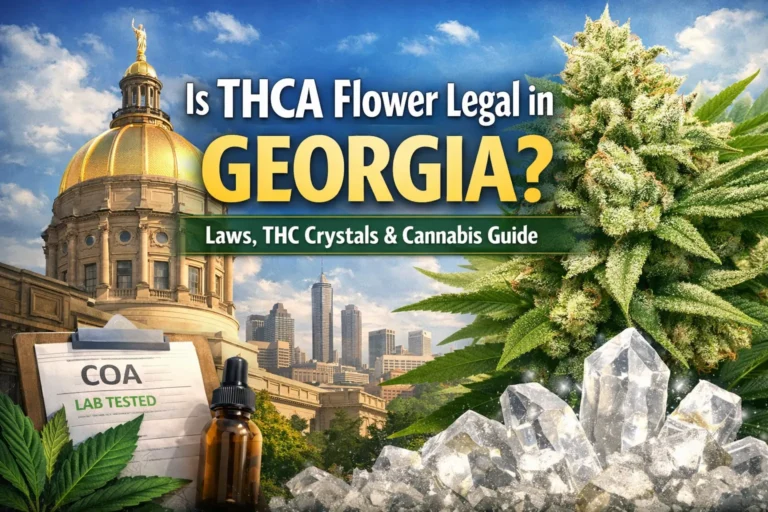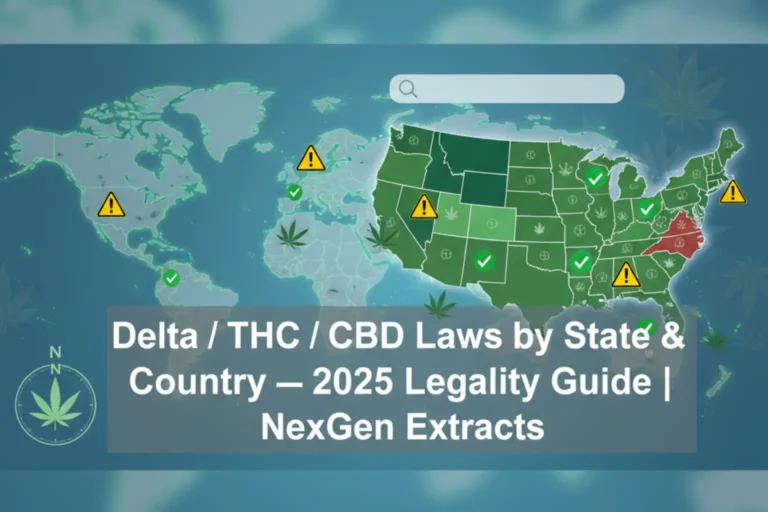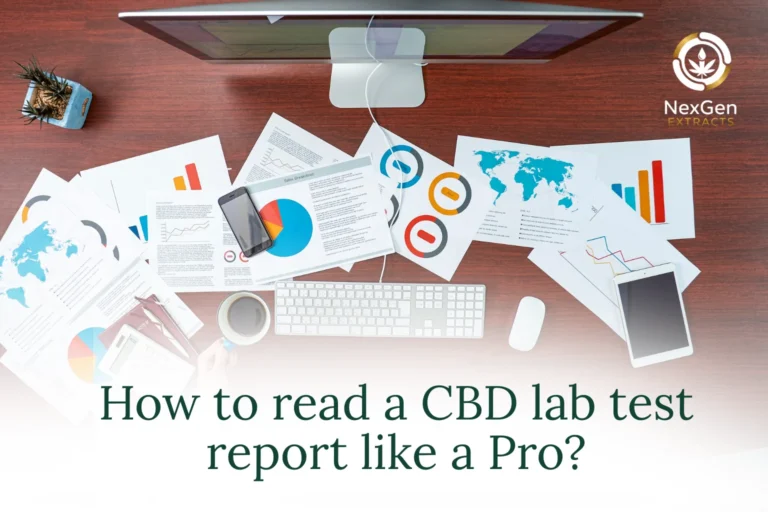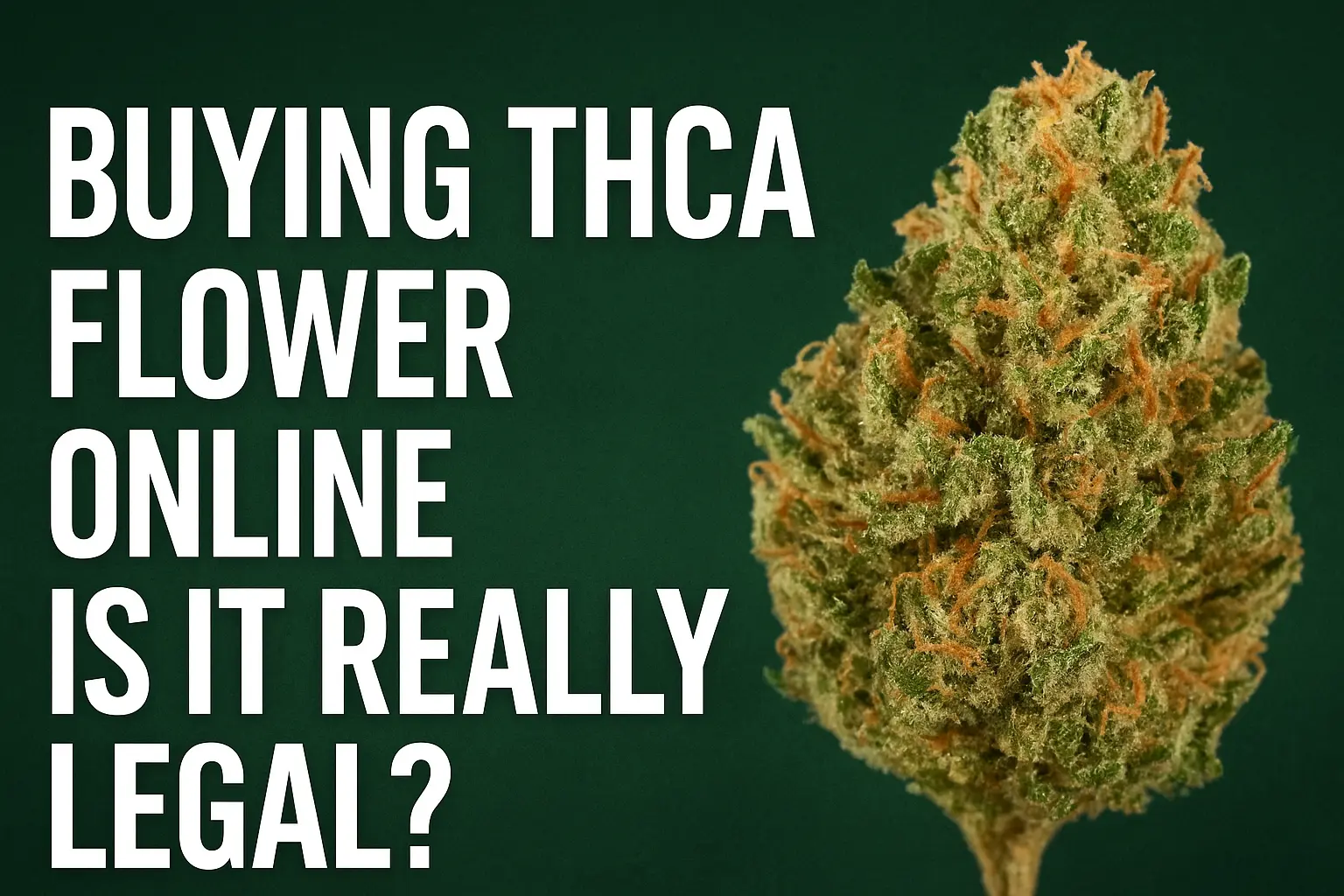
Introduction
Imagine this: you find an online store offering “THCA flower” at a good price, with lab reports, appealing packaging, and fast shipping. Sounds great, right? But when you click “buy,” a hundred invisible laws and interpretations come into play. Because legality isn’t just about what’s printed on the website — it’s about how federal law, state law, science, enforcement, and definitions all collide. If you want to buy THCA flower safely and avoid legal risk, knowing the law isn’t optional — it’s essential.
What Is THCA Flower (in Plain Terms)
- THCA stands for tetrahydrocannabinolic acid. It’s the raw, non-psychoactive precursor of THC. The “A” means “acid.”
- In hemp plants, most THC is actually THCA before it’s heated or “activated” (decarboxylated). When you smoke or vaporize flower, THCA converts into delta-9 THC, which causes psychoactive effects.

-
THCA flower refers to buds harvested from cannabis/hemp plants that have high THCA content BUT are claimed to have very low delta-9 THC (or comply with thresholds), so they fall under hemp rather than “marijuana” (in some jurisdictions).
Federal Landscape: What the 2018 Farm Bill Changed, and What It Didn’t
What Was Legalized
-
The 2018 Farm Bill removed hemp (defined as cannabis with no more than 0.3% delta-9 THC on a dry weight basis) from the federal Controlled Substances Act. So hemp, and some hemp-derived products, became legal at the federal level under certain conditions.
-
Because THCA is not delta-9 THC, many argue that THCA flower, if it meets the delta-9 THC threshold, is covered under this “hemp” legalization.
What Was Not Solved
-
The law does not clearly limit how much THCA a plant may have, as long as delta-9 THC stays under 0.3%. That means you can have very high THCA in plant material, by some interpretations — until it’s heated.
-
Lab testing and state law definitions vary: some states have strict “total THC” or “potency” rules that count THCA (once converted) in the legal threshold.
State Laws & Regulation: It’s All Over the Place
Here’s where things get messy. Even if something is legal federally, states often impose stricter rules or use different measurement methods. Some states treat THCA flower as hemp (if it meets delta-9 test), others treat it like marijuana or ban smokable hemp altogether.
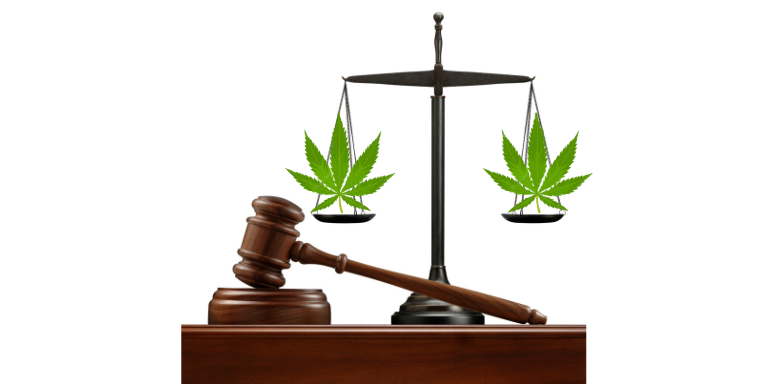
Some state patterns:
-
“Total THC” rules: In places where laws require “total THC” (i.e. sum of delta-9 plus what THCA would become after decarboxylation), high-THCA flower might exceed legal thresholds even if raw delta-9 is low.
-
Smokable hemp bans: Certain states ban hemp flower or smokable forms of hemp entirely, regardless of THC content. So even if federal law says hemp is legal, that product might be prohibited in local jurisdictions.
-
Licensing or retailer restrictions: Some states allow THCA flower only via dispensaries or under special hemp program licensing, not through head shops or regular online shipping.
How Shipping Online Adds Risk
Buying THCA flower online isn’t just about whether your state law allows it — shipping often crosses state lines, which introduces extra risk.
-
If you order from a state where THCA flower is allowed and send to a state where it’s prohibited, your package could be seized (or you might face legal consequences locally).
-
Online retailers often provide Certificates of Analysis (COAs) to show product delta-9 THC levels, lab results, etc. But the presence of a COA doesn’t guarantee legal protection — the law in the destination state still matters.
-
Enforcement tends to vary: some states are aggressive, others are lax. Absence of enforcement doesn’t mean it’s legal — it means you might not get caught, but risk remains.
Key Legal & Regulatory Updates to Watch
In mid-2025, several developments affect how THCA and other hemp/intoxicating-hemp derivatives are regulated:
-
Proposed federal legislation / amendments to redefine “hemp” or include combined/current + potential THC (including THCA) in threshold tests. This could change what currently qualifies.
-
State laws tightening “intoxicating hemp” rules, such as limiting combined THC or banning smokable hemp flower.
-
Court decisions affirming that states may impose stricter rules than federal, especially around public health, youth access, or potency.
These developments mean that even if THCA flower is currently legal in your area, that status could change relatively quickly.
The Harsh Truths — What Can Go Wrong
Here are the downsides or risks:
-
Decarboxylation risk: Once THCA is heated (smoked, baked, vaped), it converts to delta-9 THC. If tests or laws look at “total THC” (potential post-heat), high THCA could push you over the legal limit.
-
Legal ambiguity: Because many laws are vague on THCA, you could unknowingly violate state or local law. Worse, definitions and thresholds might be retroactively enforced or interpreted.
-
Enforcement risk: You may face seizure, fines, or worse if law enforcement interprets product incorrectly. Even with a COA, mislabeling, or a discrepancy can lead to trouble.
-
Quality & safety: Without solid regulation, there’s risk of contaminated products, mislabelled labs, old or poorly stored flower (which converts more THCA to THC unintentionally).
-
Reputation risk (for businesses): If your product is legal in one jurisdiction but questionable in another, you may face public backlash or legal costs.
Where It’s Sweet — What Works, What’s Helpful
There are places where THCA flower is relatively safer to buy and ship. Here are what some states do right or allow:
-
States that align strictly with delta-9 test only (i.e. they only care if delta-9 THC is under 0.3%) tend to have more permissive markets for THCA flower.
-
States that have clear lab testing rules, requirements for Certificates of Analysis, good labeling, and well-defined laws give more predictability.
-
Reputable sellers who provide COAs, store flower properly (cool, dark), provide clear instructions and warnings help reduce risk.
How to Check: Is a Specific THCA Flower Offer Likely Legal for You?
If you’re thinking of buying THCA flower online, here’s a checklist to reduce surprise risk:
| Checklist | Why It Matters |
|---|---|
| Does the product show delta-9 THC ≤ 0.3% (dry weight)? | Federal “safe limit” for hemp. If delta-9 is higher, it’s probably illegal federally. |
| Does your state law use “total THC” or include THCA in measurement? | If yes, a product with high THCA might be illegal, even if delta-9 is low. |
| Is the product smokable? / are smokable forms banned? | Many states ban smokable hemp flower even if it’s legal in some other form. |
| Is COA provided, from a reputable lab? | Helps show you’re buying what they claim, but not always legally protective if local law is stricter. |
| Shipping laws & your location | Some states ban delivery of smokable hemp / hemp flower. Your address location matters. |
| Labeling, packaging, storage | Helps avoid unintentional decarboxylation; also often required by law. |
Common Myths & Misunderstandings
-
“THCA flower is just hemp, so it’s legal everywhere.” Not true. Legal under federal law if delta-9 THC ≤0.3%, but state laws can override or tighten restrictions.
-
“If I don’t smoke it, it won’t convert to THC.” True to some extent — THCA doesn’t convert until heated — but heat, storage, age, light exposure can cause partial conversion, and lab/state laws may assume “potential” conversion.
-
“Providing a lab test (COA) protects me legally.” COA is good and often required, but doesn’t guarantee immunity from state law, which may define rules differently.
-
“No one is enforcing this, so it’s safe.” Enforcement tends to lag, but increases every year. Laws catch up; regulatory action is intensifying, especially for intoxicating hemp products.
Best Practices for Buyers & Sellers
For Buyers:
-
Always read the COA; understand not just delta-9, but what’s being measured and what testing method.
-
Store product properly (cool, dark, low humidity) to avoid degradation or undesirable chemical transformations.
-
Be aware of local laws — city, county, and state — not just “state law.” Local smoke bans, ordinances, or postal regulations may apply.
-
Don’t assume online retailer’s “legal” label = legal. Ask for proof, look for precise wording.
For Sellers / Businesses:
-
Use reputable labs, provide transparent COAs.
-
Ensure packaging and labeling are accurate, with warnings, storage instructions.
-
Track evolving legislation in top customer states; update product offerings or shipping policies accordingly.
-
Consider legal counsel around “total THC” vs. “delta-9 only” definitions.
-
Keep up good supply chain, storage, testing to avoid unintentional violations.
Legal Trends & What Might Change Soon
-
Federal proposals to revise the definition of hemp are being discussed, possibly to include “total THC”, not just delta-9 THC, meaning THCA would count toward the limit. This could make many current THCA flower products illegal under federal law if passed.
-
States have already been doing this: adding rules for total THC, banning smokable hemp flower, or restricting online sales/deliveries. Some states have prohibited THCA flower even if it complies with delta-9 thresholds, simply because of the potential psychoactive nature after conversion.
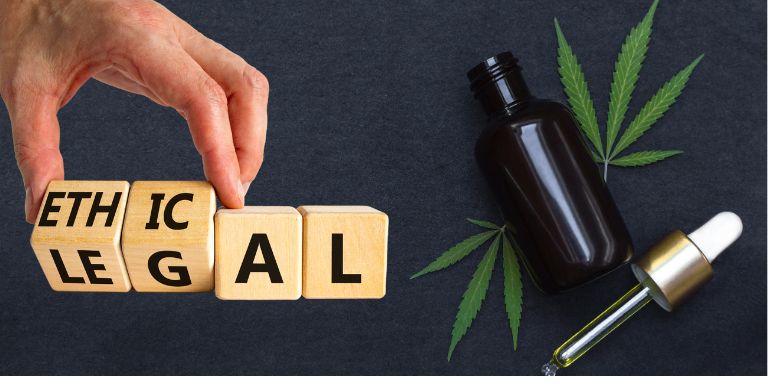
-
Courts are increasingly upholding state powers to enforce stricter hemp or intoxicating hemp product rules. Expect to see more judicial rulings that clarify definitions.
-
Increased public health scrutiny: youth safety, potency, mis-labeling, intoxicating products pushed into mainstream without oversight. These concerns are pushing tighter lawmaking.
FAQ — What People Often Ask
Q: Is THCA flower legal federally if delta-9 THC is under 0.3%?
A: Essentially yes — under the Farm Bill, hemp is defined that way. But that doesn’t guarantee it’s legal where you live. Local state laws may impose stricter standards (including total THC or restricting smokable hemp).
Q: If I smoke it, will it become illegal?
A: It might. Once THCA is heated (smoked, vaporized, baked), it decarboxylates into delta-9 THC. If the resulting THC exceeds legal thresholds (if the law measures “potential THC” / total THC), that could be illegal under certain state or local laws.
Q: Can they seize it in transit (by mail)?
A: Yes, if state laws or postal laws in either the origin or destination state consider the product illegal. If shipping to a state where smokable hemp or THCA is not allowed, there’s risk.
Q: Does international law differ?
A: Great question. Yes — many countries have stricter cannabis or hemp laws; THCA might be treated like THC or banned entirely in jurisdictions without hemp-friendly laws. Always check local import laws.
Case Examples
-
Florida: Even though THCA derived hemp flower is available, Florida uses “total THC” calculations and has updated its regulations on labeling, packaging, marketing, and requires child-resistant packaging. Products must pass the combined delta-9 + potential converted THCA threshold to remain legal.
-
Arkansas: Recently updated hemp laws include testing final hemp products for “total THC.” Smokable hemp flower sales are restricted or banned unless under specific licensing.
These examples show how two states with hemp-legal frameworks still create a lot of risk for THCA flower products or sales.
The Sweet Potential — Why Some Demand It
-
Enthusiasts like that THCA flower offers a more “natural” or “raw” cannabis experience before decarboxylation.
-
There’s interest in potential medicinal properties of THCA (early, nascent research) — some want disabled psychoactive effects but retain other cannabinoid benefits.
-
Because of the legal ambiguity, some consumers see THCA flower as a compromise between full THC cannabis and CBD-only hemp products.
The Harsh Reality — What It Could Cost
-
Legal penalties, including seizure of product, fines, or criminal charges, if state laws define THCA improperly or impose strict limits.
-
Loss of money or reputation if products are pulled, recalled, or deemed mislabelled.
-
Bigger sellers may survive—but smaller operations or individuals are more vulnerable to legal risk.
-
Inconsistent availability, sudden bans, or regulatory changes could make business planning risky.
Final Take — Is It Worth It?
If you want to buy THCA flower online, yes — it can be done legally, under the right conditions: valid COA, compliant delta-9 THC content, in a state that allows hemp or THCA flower, shipping to somewhere that allows it. But it’s not risk-free. The more you know about your state laws (and the laws of where the seller is located), the safer you are.
For businesses, playing in this space requires being nimble, watching laws constantly, staying transparent, and possibly being ready to adapt or pull products if laws change.
FAQ (Short Snippets for Rich Snippets)
Q: Will buying THCA flower online get me arrested?
A: Only if your location’s laws define THCA flower as illegal, or if combined THC (real + potential) exceeds state thresholds. Often, risk is low—but not zero.
Q: Is THCA considered marijuana?
A: Not always. Under federal law if delta-9 THC ≤0.3%, hemp (including some THCA flower) is legal. But some states may treat high-THCA flower like marijuana based on their definitions and how they measure “total THC.”
Q: Can lab testing guarantee it’s legal?
A: It helps. A reliable COA with testing methods and delta-9 levels provides evidence. But legality still depends on local regulation, which may require “total THC” rules or other definitions.
Q: What should I do if I live in a state with ambiguous laws?
A: Be cautious. Buy from reputable sellers, get lab test info, avoid smokable forms if unsure, and consult local hemp or cannabis laws. When possible, consult a lawyer.

